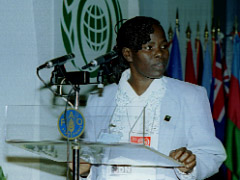


CAUCUS OF RELIGIOUS ORGANIZATIONS | ||
Ms. Anne Wacira, Assistant Provincial Development Co-ordinator, Nairobi, Kenya, World Council of Churches (WCC) | ||

I am grateful for the opportunity to speak on behalf of religious organizations, but I cannot claim to speak for all the world's religions. Non-governmental organizations in the Forum were informed only at 12 noon of Tuesday 12th that they could select one spokesperson for religious faiths. The group which was able to meet to prepare this statement was predominantly Christian, but has tried to recognize the insights of all faiths. Today's problems of poverty and hunger are not merely political and economic but also ethical. The people of the industrialized world are unsustainably consuming food and unsustainably using the world's natural resources. Land, water, genetic resources and all of nature are ours as gifts. Many of these resources, like soil and seeds, so essential for the future supplies of food are being eroded. As human beings, we are called to live in sisterhood and brotherhood with the whole of nature. In the twenty-first century, it will be, become, a matter of human survival to develop an ethic of sufficiency, planning to use our resources sparingly and distributing them more equitably between and within countries. This ethic will need to inspire the politics of generosity to ensure that all the hungry are fed. The goal must be to achieve food security at the household and the individual level, ensuring that farmers are enabled to produce for local consumption before they produce for the market. People and their need for food must have the primary claim on our attention and our policies. Trade and technology are only the secondary instruments to meet those priorities. At previous Summits, religious leaders have spoken of the dangers of globalization and unrestrained trade liberalization. Governments negotiating in the World Trade Organization have given priority to trade, even where this has been shown to threaten the livelihood and food security of small producers. It is refreshing to see that, in Commitment 4, governments have agreed on a more balanced approach, calling instead for a fair and market-oriented world trade system. A fair trading system is one that provides access to markets, above all local and regional markets for the poorest producers. We also need to recognize and remedy the impact of structural adjustment policies which have compelled people to mortgage their children in order to salvage external debts. The call for an international, regulatory environment for Transnational Corporations (TNCs) was removed from the Plan of Action. To ignore the work and power of TNCs is to ignore the reality of food production and distribution. We should welcome the signs of readiness for dialogue between the corporate sector and civil society, but any comprehensive Plan of Action must at least recognize the role of TNCs and their negative input. People are hungry for peace, just as people are hungry for food. The arms trade is a major factor in the present economic globalization. It is one of the principal causes of conflict and displacement of peoples from their sources of food, many of whom go hungry. We must stop using food as a weapon. The Plan of Action seems to clarify the content of the right to adequate food. Governments have referred this task to United Nations bodies. Leaving out the suggestion of an international code of conduct, or food security convention, we should guarantee this most basic of human rights. We wonder whether the proposal of Commitment 7, for possible voluntary guidelines for food security for all, really measures up to the urgency of the problem, that is the need to tackle so much preventable death and disablement amongst the world's children. In conclusion, we have been created with a free will, we are called to choose life, but we are free to accept or ignore that call. Governments may adopt the Rome Declaration and Plan of Action, but because the Plan is not a binding treaty they are free to implement it or ignore it. As representatives of religious organizations, we plead that all those in responsible positions would choose life. Governments alone cannot do it. Civil society alone cannot do it. Must we not act as partners for a world which ensures food security for all. If not now, when? If not we-together, who? | ||
|
|
|
|

 |